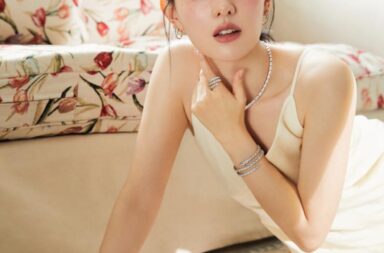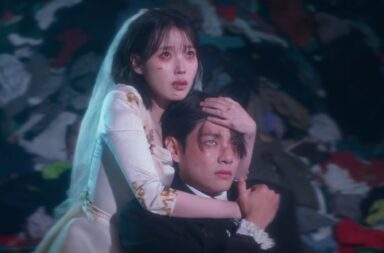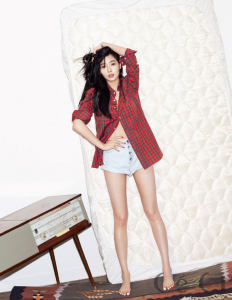 Often misunderstood because of its immense multiplicity of meanings, postfeminism is a highly contested and nebulous place to be in feminism. The term has commonly been used to announce a historical shift (after the height of second-wave feminism) or a backlash against feminism (Gill, 2011).
Often misunderstood because of its immense multiplicity of meanings, postfeminism is a highly contested and nebulous place to be in feminism. The term has commonly been used to announce a historical shift (after the height of second-wave feminism) or a backlash against feminism (Gill, 2011).
This backlash has been articulated in various ways: a disillusionment with white feminism, an over-emphasis on theory instead of political action, the inclusion of queer narratives – all these are backlashes not against the idea of feminism in itself but against the general reality of feminism – a movement by, for and of white, upper middle class, straight women.
But within the ambit of media and culture studies, postfeminism has come to literally mean after-feminism. This backlash believes that the world does not need feminism anymore because women have already achieved equality, not only with men but among fellow women as well, entangling a feminist and anti-feminist discourse. A basic example would be Charlie’s Angels: physically strong women who are constantly objectified, fetishized and literally controlled by an amorphous male voice.
Our readers might think of this phenomenon in the context of K-pop — more commonly (and correctly) associated with “commodity feminism” — as when a female K-pop artist has been crowned with the prickly tiara of feminism. According to Gill, post-feminism is a distinctive sensibility, constituting a number of interrelated themes. I will take up some of these interrelated themes and juxtapose them with MVs both hailed and dissed by the K-pop audience.
Lee Hyori’s “U-Go-Girl”: Makeover Paradigm and Self-Surveillance
[youtube https://www.youtube.com/watch?v=v8Y3NL1KeNQ]Lee Hyori is one of the few women in mainstream K-pop who has spoken, albeit without the moniker of “feminism,” about women’s empowerment in the realm outside of an MV, putting concept into practice. A quick overview of her MVs not only shows her maturing as a singer but also as a feminist as she persistently puts forth a nuanced understanding of women’s issues.
“U-Go-Girl” was one of her early ‘feminist’ endeavours, and for a lot of viewers the rousing call of “You go girl!” was every bit empowering. Even the lyrics asked women to be confident and honest to themselves:
Starting now be more honest
Starting now with more confidence
Show your feelings
Right now
But the irony lies in the first few lines of the song and the entire video:
What clothes should I wear today?
What would be the best way to fix my hair?
How about this? How about that?
Don’t worry about it, Girl
What should I say today?
What’s the best way to express myself?
How about this? How about that?
Don’t worry about it, Girl
But “girl” has to worry about it because, according to Hyori, the only way to be confident and honest is to shed those spectacles and odd dresses. The idea that you can only be confident by prescribing to a certain type of desirable body runs exactly against the notion of empowerment because empowerment then becomes as ephemeral as the transient body and the melting makeup. There is nothing inherently confident about the “girl”; it has to be facilitated by external, cosmetic sources.
This is the ‘makeover paradigm’ where women are urged to change themselves into the ideal woman by designing it in narratives which asks them to be unafraid of change, to be ‘bold’ (i.e., go for short dresses), consciously driving them to attain the dominant idea of beauty. The problem does not lie with changing ourselves but rather with changing ourselves in order to achieve the femininity that society has prescribed. The makeover paradigm is intrinsically tied to ‘self-surveillance,’ as explained here with reference to Foucault‘s “Panopticon.”
Hyomin’s “Nice Body”: Femininity as Bodily Property and Shift from Objectification to Subjectification
[youtube https://www.youtube.com/watch?v=RYs_GMfCqTI]People have been rather divided over this video: Lo felt that it was “a misogynistic mess” while others believed that the MV was being approached from a western, liberal perspective. Even from my South Asian perspective, the MV is a mess, but my initial reaction to it was different.
What I couldn’t wrap my head around was why were people shaming her because she wanted a nice body. What is wrong with her self-objectification? If she wants men to have dirty thoughts about her, then why are we losing our sleep over it? I was committing a common mistake — placing an unhealthy importance on individualism.
Every woman is an individual, true. But every woman also represents her gender, caste, race, and class, and to think that she can be judged bereft of those identifiers is just wishful thinking. But that is exactly what postfeminism strives for. By placing a disturbing amount of importance on the body of a woman, it puts forth the idea that if you work for it, you can achieve it. When one looks at it as a matter of working hard for a nice body and a pretty face, it does seem rather unfair to call the MV misogynist, but what is this nice body? It is:
My body is a nice nice body
Long legs, sexy waist
(Give me love, give me love, give me love)
My body is a nice nice body
And,
You’re like those Western girls who work out
Everyone looks like plain bamboo trees compared to you
I’m already imagining how I can accidentally run into you
I’m a growing tree of dreams
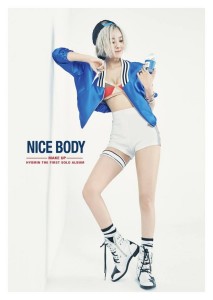 A nice body is hence tall, slim and Western (i.e, fair), and the rest are “plain bamboo trees,” of course. McRobbie calls this the “post-feminist symbolic violence.” An example would be instructional articles on fashion faux pas.
A nice body is hence tall, slim and Western (i.e, fair), and the rest are “plain bamboo trees,” of course. McRobbie calls this the “post-feminist symbolic violence.” An example would be instructional articles on fashion faux pas.
Let’s see how this works. Hyomin never explicitly mentions that being fat is bad — she enjoys the donuts and seems happy — nor does she say her body is the best. What she does instead is imply that being fat is not the end of the world, but you should still get that ‘nice body’ because “You deserve it,” reminiscent of L’Oreal’s “You’re worth it” slogan — a ‘nice body’ is your right, not your choice.
The symbolic violence is acted out by the measuring tape, the weight monitor, the bikini, the punching bag — the means to get that nice body — covertly implying that if you are unfamiliar with this jargon then you don’t have a nice body. Throughout, Hyomin seems like a subject because she is singing the song, she is exercising, she is enjoying — there seem to be no external influence. But at the end of the day, she is an object because she goes through a painful process of reconstruction — “I will endure the pain” — to appease Loco — “You have no idea how much I worked for you” — while creating an instruction manual of self-objectification and harm for other women.
It would have been one thing if she were only talking about herself, but the reiterations of “all girls” and “all guys” turns her into a self-proclaimed spokesperson for harmful ideas of femininity and masculinity. This is not what all girls or all guys want, but watching the MV may make all girls or all guys to believe that they should be wanting this, and that is what makes the video essentially problematic.
Hyuna’s “Red”: Marked Sexualization of Culture
[youtube https://www.youtube.com/watch?v=oTXCgR93zC8]If one of the major aspects of postfeminism is an overriding importance on the body, then the other would be the sexualization of the same — both happen simultaneously. Women’s bodies and sexuality have been first denied existence, then shamed for existing and finally allowed to appear into the public space only in models approved by patriarchy. As long as you’re feminine, straight and white and wear clothes that do not garner ‘male attention’ — as long as you remain invisible — your body and sexuality has patriarchal approval. Anything else is a deviance.
Against this backdrop, it is important to have critical discussions around women’s bodies and sexuality. But the problem arises when that becomes the only discussion, when sexualization becomes the only discourse of empowerment without delving into the nitty-gritty of who, how and for whom is the sexualization. The narrative usually asks women to be independent and embrace their sexuality, turning them into desiring subjects, seemingly shedding their object status but the sudden onslaught of K-pop’s ‘sexy’ girl groups reveals the complications of such a narrative.
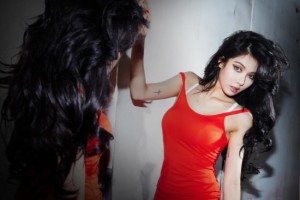 Capitalist as it is, the industry wouldn’t have switched to the ‘sexy’ concept if it did not have a market for it, and the availability of a market could mean two things: Celebration of a woman’s sexuality or objectification of the same.
Capitalist as it is, the industry wouldn’t have switched to the ‘sexy’ concept if it did not have a market for it, and the availability of a market could mean two things: Celebration of a woman’s sexuality or objectification of the same.
The very fact that we can claim that all ‘sexy’ MVs run under some formulaic sexiness shows that, while there is a recognition of women as sexual beings, their sexuality is being commodified for a male audience. By accepting the woman as a sexual agent who wants sex, who demands sexual gratification, there is a propagation of the idea that the woman holds power such as Dal Shabet‘s “Be Ambitious”. However, when these MVs are littered with crotch and chest shots, completely dehumanizing the woman by systemically dissecting her body into a mere amalgamation of her breasts, vagina and butt, whatever power prescribed by the lyrics is diluted.
Hyuna has been creating binary factions in the K-pop fandom with one part glorifying her as a feminist while the other demeaning her. I personally have always liked Hyuna, partly because she seems aware of her sexiness and partly because she is one of the few who hasn’t appropriated a feminist agenda to justify or glorify her kind of sexiness. However, that does not mean she doesn’t come with her own set of problems, especially with “Red.”
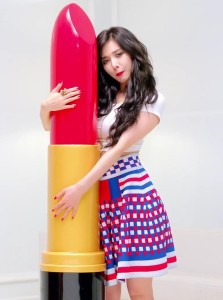 Unlike Hyomin or Hyori, Hyuna is not instructional. She only states that she is infallible and irreplaceable. While she starts with her nice body, she goes on to emphasize her killer dance, her source of confidence. Considering the backlash Hyuna gets, her celebration of “Hyuna” is liberating; however, it is accompanied by symbolic violence against others.
Unlike Hyomin or Hyori, Hyuna is not instructional. She only states that she is infallible and irreplaceable. While she starts with her nice body, she goes on to emphasize her killer dance, her source of confidence. Considering the backlash Hyuna gets, her celebration of “Hyuna” is liberating; however, it is accompanied by symbolic violence against others.
While she is the golden bunny girl, the rest of the ‘common’ girls are monkeys or inferior animals despite the fact that their bodies are similar. This sheds light on how women may perceive these videos: when a woman with the same body as you keeps on reiterating that she is still better, you are conditioned into believing that there is something wrong with your body.
The immense emphasis on the “red lipstick” brings in the concept of “power femininity” — what has been shamed as being typically feminine such as makeup is reclaimed as a source of power and identity construction — which is fantastic, but there is a missing discourse between the red lipstick and the reclamation of the same. Pop stars are shamed for their no-makeup faces and constantly live under the pressure of being pretty. So when Hyuna talks about her red lipstick as a weapon she posits the lipstick as a free ticket to empowerment and does not realize that it is the same weapon which oppresses her on a daily basis.
This is not the most comprehensive analysis of the plague of postfeminism in K-pop, but hopefully it has deepened the straight-forward discourses on feminism and sexism. Sole focus on body and sexuality and removal of political charge while appropriating slivers of feminist jargon truly turns feminism into a ‘concept’ in K-pop because it does not push people into joining the movement but lulls them into believing “You’ve come a long way, baby.”
(YouTube [1] [2] [3], Gill, Rosalind and Christina Schraff. New Feminities: Postfeminism, Neoliberalism and Subjectivity. Palgrave Macmillan, 2011. PDF, Gill, Rosalind. “Postfeminist media culture: Elements of A Sensibility.” European journal of cultural studies (2007): 147-166. PDF, McRobbie, Angela. “Post‐feminism and popular culture.” Feminist Media Studies (2004): 255-264. PDF.Communication Encyclopedia, Lyrics from Kpop lyrics, Images via Cube Entertainment)

